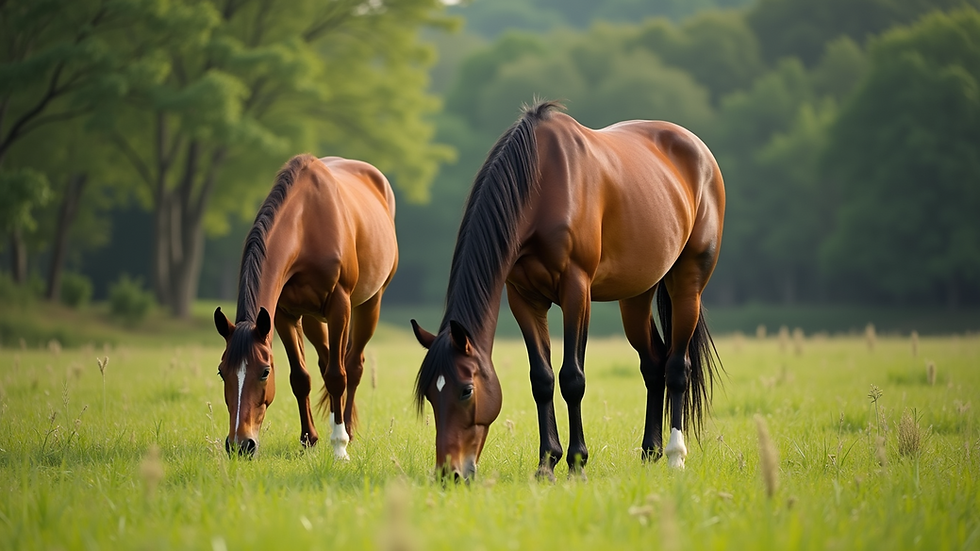Unveiling the Critical Role of Vitamin E for Optimal Performance in Horses
- Andrea Malcolm
- Jul 30, 2025
- 4 min read
Horses are incredible animals known for their strength, speed, and agility. For performance horses, meeting their nutritional needs is vital for peak performance and recovery. One nutrient that often gets overlooked is Vitamin E. While it's essential for all horses, performance horses have a higher requirement due to their intense training and competition schedules. In this post, we’ll uncover why Vitamin E is crucial, the dangers of deficiency, and how to ensure your horses get enough of this important nutrient.
Understanding Vitamin E
Vitamin E is a fat-soluble antioxidant that is essential for maintaining equine health. It protects cells from oxidative stress caused by free radicals, which can result in cellular damage. This nutrient supports various bodily functions, including:
Muscle health: Vitamin E helps prevent muscle damage during rigorous activities.
Immune function: It boosts the immune response, helping horses fend off illness.
Reproductive health: Ensures mares and stallions maintain optimal fertility.
Since horses cannot produce Vitamin E on their own, it’s crucial for owners to supply it through feed, supplements, and forage. By recognizing the importance of Vitamin E, we can better support our equine companions in their activities.
The Importance of Vitamin E for Performance Horses
Horses engaged in performance activities—like dressage, show jumping, roping, or barrel racing—experience intense physical exertion. This increased activity raises their need for nutrients, especially Vitamin E.
When a horse exercises, oxidative stress rises, making the antioxidant properties of Vitamin E vital for reducing inflammation and tissue damage. A study found that performance horses with adequate Vitamin E levels exhibited less muscle fatigue and quicker recovery times—up to 50% faster than those with deficiencies. Insufficient Vitamin E can lead to compromised muscle function, which affects performance and prolongs recovery.
Consequences of Vitamin E Deficiency
Inadequate Vitamin E intake may lead to serious health issues, including:
Muscle damage: Conditions like "white muscle disease" may arise, leading to significant muscle weakness and loss, affecting horses’ ability to perform.
Impaired immune function: With a weakened immune response, horses are at a higher risk for infections and diseases, which can hinder their training and performance.
Neurological issues: Severe deficiencies can cause disorders like equine degenerative myeloencephalopathy (EDM), resulting in progressive muscle weakness and coordination issues.
Reproductive challenges: For breeding mares and stallions, Vitamin E is vital for reproductive health. A deficiency can lead to decreased fertility rates, reducing breeding success.
According to researchers, approximately 70% of performance horses may not receive enough Vitamin E, leading to potential health risks.
Identifying Symptoms of Deficiency
Recognizing symptoms of Vitamin E deficiency is crucial for horse owners. Common signs include:
Muscle tremors or weakness
Poor coat condition that appears dull or dry
Decreased stamina or reluctance to perform
Loss of coordination or balance
If you observe any of these signs in your horse, it's important to consult a veterinarian for a thorough assessment and possible dietary changes.
How to Ensure Adequate Vitamin E Intake
Now that we understand Vitamin E’s significance and the consequences of deficiency, here are a few strategies to ensure performance horses receive enough of it:
Focus on Quality Forage: High-quality hay or pasture is an excellent source of Vitamin E, particularly fresh green grasses. Be aware that Vitamin E levels can vary based on cutting and storage, so fresh grass or well-stored hay is your best bet.
Choose Fortified Feeds: find feeds that are tailored for performance horses and come fortified with (pure) Vitamin E along with other essential nutrients. Always read labels carefully to ensure your feed meets your horse’s needs. ForagE+ Performance Horse Feed already has this for you
Consider Supplements: If your horse struggles to meet Vitamin E requirements through diet alone, supplementation is a viable option. These supplements come in oils, powders, or pellets. Consult a veterinarian before introducing new supplements. Remember pure Vitamin E is more bioavailable (by 50%) than synthetic vitamin E (often labeled as Vit E supplement). ForagE+ Performance Horse feed already contains this.
Monitor Dietary Changes: When altering your horse’s diet or feeding routine, keep an eye on their health and performance. Ensure they are receiving adequate nutrients, including Vitamin E, to support their well-being.
The Role of Antioxidants in Performance
While Vitamin E is a crucial antioxidant, it is not the only one. Other antioxidants, such as selenium, Omega 3 fatty acids, zinc, and copper also contribute to overall health and performance. A well-rounded diet that includes a variety of nutrients is essential for optimal athletic performance.
Performance horses face increased oxidative stress from training. Providing them with a mix of antioxidants, predominantly from natural sources, alongside adequate Vitamin E, will significantly support their performance and overall health.
Summing Up the Importance of Vitamin E
Vitamin E is a critical nutrient for maintaining health and performance in horses, especially those involved in high-level athletic activities. Owners must prioritize this nutrient to reduce the risk of deficiency and its serious complications.
By understanding the role that vitamins and antioxidants play in equine nutrition, we can make informed dietary choices for our horses. The aim is to keep our equine athletes healthy, happy, and performing at their best, which is certainly achievable through proper nutrition.

Let’s support our equine athletes to thrive and perform at their peak!



Comments